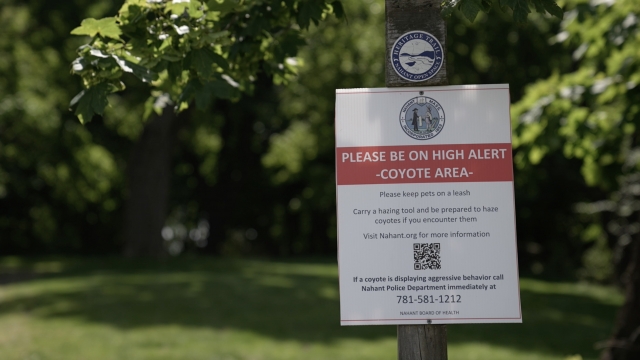Standing along the shores of the Atlantic Ocean, Chris Del Dotto looks down a paved path he's walked countless times over the years near his home in Nahant, Massachusetts. It was here in late May that Del Dotto was walking his dog JJ when the silky terrier was attacked by a coyote.
"I just hear him scream. I turned and there was a coyote with him. It dropped him and I scooped him up. The coyote was standing its ground. It wanted the dog," Del Dotto recalled.
JJ made it to the vet, where doctors determined he had a punctured lung and the 15-year-old had to be put down.
"They said, 'You should come in and say goodbye,' which was horrible," Del Dotto said.
In Nahant, JJ's death is just the latest in an ongoing saga of man versus nature.
Coyotes have become so pervasive on this 1-square-mile peninsula that earlier this year USDA sharpshooters were called in to help control the population.
Their task was to kill as many coyotes as safely possible in this thickly settled area.
"It's crazy you can't walk out your front door with your pet and you have to worry about being attacked. It's not right. It's a public safety issue," Del Dotto added.
In recent years, Nahant, a seaside town of 3,000, has seen an increasing number of coyote attacks on animals. Coyotes have become so pervasive on this peninsula that day or night, residents out on walks do whatever they can to protect themselves and their pets. Some carry baseball bats, or carry large walking sticks to haze off coyotes if needed.
SEE MORE: White dog spotted living with coyote pack gets human help after injury
In an email to Scripps News, a spokesperson for the USDA said after six months they'd only removed one coyote.
It's a decision that has divided this tiny piece of land.
"It was short-sighted, really, a bunch of hunters and the kill mentality. It's not the way to manage coyotes. Killing coyotes does not manage them," said resident Francene Amari-Faulkner.
Amari-Faulkner runs a local Facebook group that helps residents keep track of coyote sightings and attacks.
No humans have ever been hurt.
"They are here and they are not going away," Amari-Faulkner said.
Coyotes can be found in every U.S. state except Hawaii. Increasingly, they're making homes in more heavily populated areas where hunting isn't permitted, making what's happened in Nahant a tale of note for communities nationwide.
"Our community is not experiencing anything differently than other communities," Amari-Faulkner added.
For now, those USDA sharpshooters are on standby. The agency told Scripps News they'd return if aggressive behavior is reported.
Trending stories at Scrippsnews.com




